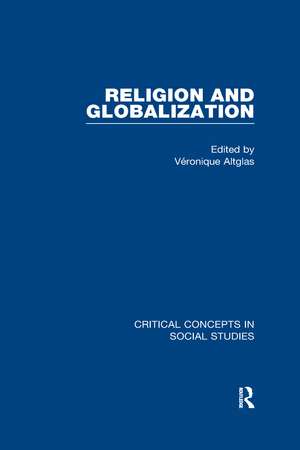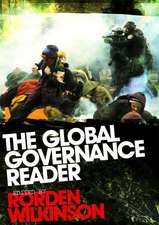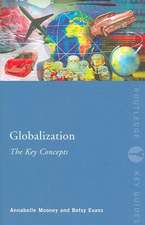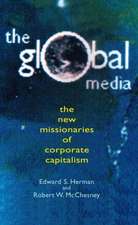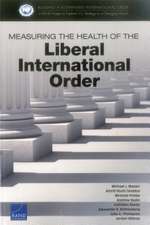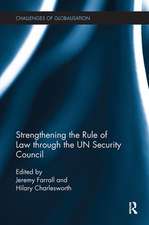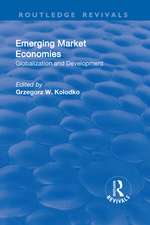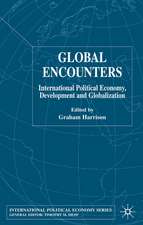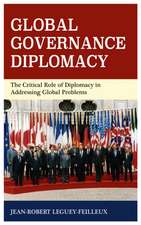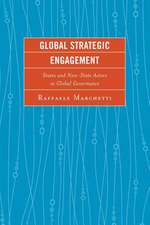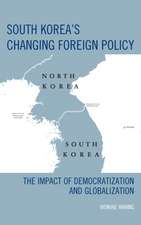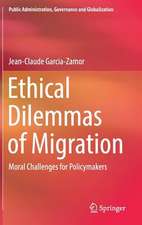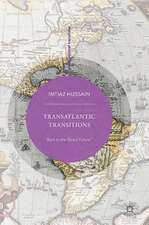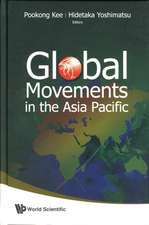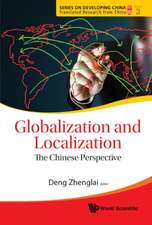Religion and Globalization: Critical Concepts in Social Studies
Editat de Véronique Altglasen Limba Engleză Hardback – 12 oct 2010
Because space and identities are reformulated by religions as they break through geographic and cultural boundaries, religion is now widely recognized as ‘the great globalizer’. In particular, as they become transnational, religions adapt to new social contexts and interact with other cultures, transforming themselves and their cultural environment. Furthermore, religions and their adherents are extremely responsive to globalization, whether they perceive it as threatening their particular identity or as an opportunity to provide a universal message to the world and become a ‘global religion’. This new four-volume collection from Routledge brings together all the key texts on globalization and religion in one easy-to-use ‘mini library’. Each of the volumes articulates theoretical and empirical perspectives: while theories attempt to grasp the nature of the relations between globalization and religion, a diversity of case studies shed light on the importance of religion in the making of contemporary global situations.
The first volume brings together the best scholarship on religion and space in its global context. Volume II entitled 'Westernization of Religion and its Counter-Trends' looks at the debates surrounding the westernization of religion including the transnational diffusion and local expressions of Christianity and counter-trends to the westernization of religion. Volume III features articles concerning the theories and case-studies on the religious responses to globalization. The final volume looks at the new challenges, epistemological and transnational faced by religion and politics in their global context.
Preț: 5487.39 lei
Preț vechi: 8303.75 lei
-34% Nou
1050.03€ • 1099.07$ • 873.94£
Carte tipărită la comandă
Livrare economică 31 martie-14 aprilie
Specificații
ISBN-10: 0415550327
Pagini: 1648
Dimensiuni: 156 x 234 mm
Greutate: 3.06 kg
Ediția:New.
Editura: Taylor & Francis
Colecția Routledge
Seria Critical Concepts in Social Studies
Locul publicării:Oxford, United Kingdom
Cuprins
PROVISIONAL CONTENTS
Volume I: Religion and Space in Global Context
Part 1: Theorizing Globalization and Religion
1. Frank J. Lechner, ‘Trajectories of Faith in the Global Age: Classical Theory and Contemporary Evidence’, in James A. Beckford and John Walliss (eds.), Theorising Religion: Classical and Contemporary Debates (Ashgate, 2006), pp. 44ߝ59.
2. Roland Robertson and JoAnn Chirico, ‘Humanity, Globalization, and Worldwide Religious Resurgence: A Theoretical Explanation’, Sociological Analysis, 1985, 46, 3, 219ߝ42.
3. José Casanova, ‘Religion, the New Millennium, and Globalization’, Sociology of Religion, 2001, 62, 4, 415ߝ41.
Part 2: Religion and Space in Global Context
a. Space, Centre, and Periphery
4. Elizabeth McAlister, ‘Globalization and the Religious Production of Space’, Journal for the Scientific Study of Religion, 2005, 44, 3, 249ߝ55.
5. Peter Beyer, ‘The City and Beyond as Dialogue: Negotiating Religious Authenticity in Global Society’, Social Compass, 1998, 45, 1, 67ߝ79.
6. Joel Robbins, ‘Is the Trans- in Transnational The Trans- in Transcendent?’, in Thomas J. Csordas (ed.), Transnational Transcendence: Essays on Religion and Globalization (University of California Press, 2009), pp. 55ߝ71.
7. Jerry K. Jacka, ‘Emplacement and Millennial Expectations in an Era of Development and Globalization: Heaven and the Appeal of Christianity for the Ipili’, American Anthropologist, 2005, 107, 4, 643ߝ53.
b. Diasporas and their Territories
8. Chantal Saint-Blancat, ‘Islam in Diaspora: Between Reterritorialization and Extraterritoriality’, International Journal of Urban and Regional Research, 2002, 26, 1, 138ߝ51.
9. Pnina Werbner, ‘The Place Which Is Diaspora: Citizenship, Religion and Gender in the Making of Chaordic Transnationalism’, Journal of Ethnic and Migration Studies, 2002, 28, 1, 119ߝ33.
10. Steven Vertovec, ‘Tracing Transformations of Hinduism’, The Hindu Diaspora: Comparative Patterns (Routledge, 2000), pp. 7ߝ38.
11. Fenggang Yang and Helen Rose Ebaugh, ‘Transformations in New Immigrant Religions and Their Global Implications’, American Sociological Review, 2001, 66, 2, 269ߝ88.
12. Peggy Levitt, ‘Local-Level Global Religion: The Case of US-Dominican Migration’, Journal for the Scientific Study of Religion, 1998, 37, 1, 74ߝ89.
13. Sarah J. Mahler and Katrin Jansing, ‘Toward a Transnationalism of the Middle: How Transnational Religious Practices Help Bridge the Divides Between Cuba and Miami’, Latin American Perspectives, 2005, 32, 121ߝ46.
c. Transcending Space: Religions and the Media
14. David Maxwell, ‘Print, Post & Proselytism in the Making of Global Pentecostalism’, African Gifts of the Spirit: Pentecostalism and the Rise of a Zimbabwean Transnational Religious Movement (James Currey, 2006), pp. 17ߝ37.
15. Jeffrey K. Hadden, ‘The Globalization of American Televangelism’, in Roland Robertson and William R. Garrett (eds.), Religion and Global Order (Paragon House, 1991), pp. 221ߝ44.
16. Thomas G. Kirsch, ‘Ways of Reading as Religious Power in Print Globalization’, American Ethnologist, 2007, 34, 3, 509ߝ20.
Volume II: Westernization of Religion and its Counter-Trends
Part 3: Debating the Westernization of Religion
17. Peter Beyer, ‘The Religious System of Global Society: A Sociological Look at Contemporary Religion and Religions’, Numen, 1998, 45, 1, 1ߝ29.
18. Bryan S. Turner, ‘Globalization, Religion and Empire in Asia’, in Lori Beaman and Peter Beyer (eds.), Religion, Globalization and Culture (Brill, 2007), pp. 145ߝ66.
19. Wouter J. Hanegraaff, ‘Prospects for the Globalization of New Age: Spiritual Imperialism Versus Cultural Diversity’, in Mikael Rothstein (ed.), New Age Religion and Globalization (Aarhus University Press, 2001), pp. 15ߝ30.
Part 4: Transnational Diffusion and Local Expressions of Christianity
20. Paul Freston, ‘Globalization, Religion, and Evangelical Christianity: A Sociological Meditation from the Third World’, in Ogbu U. Kalu and Alaine M. Low (eds.), Interpreting Contemporary Christianity: Global Processes and Local Identities (Wm. B. Eerdmans Publishing Co., 2008), pp. 24ߝ51.
21. Afe Adogame, ‘Globalization and African New Religious Movements’, in Ogbu U. Kalu and Alaine M. Low (eds.), Interpreting Contemporary Christianity: Global Processes and Local Identities (Wm. B. Eerdmans Publishing Co., 2008), pp. 296ߝ316.
22. Richard Burgess, ‘Freedom from the Past and Faith for the Future: Nigerian Pentecostal Theology in Global Perspective’, PentecoStudies, 2008, 7, 2, 29ߝ63.
23. Mark R. Mullins, ‘The Empire Strikes Back: Korean Pentecostal Mission to Japan’, in Karla Poewe (ed.), Charismatic Christianity as a Global Culture (University of South Carolina Press, 1994), pp. 87ߝ102.
24. Laennec Hurbon, ‘Pentecostalism and Transnationalisation in the Caribbean’, in André Corten and Ruth Marshall-Fratani (eds.), Between Babel and Pentecost: Transnational Pentecostalism in Africa and Latin America (Hurst & Co., 2001), pp. 124ߝ41.
25. Thomas J. Csordas, ‘Global Religion and the Re-Enchantment of the World: The Case of the Catholic Charismatic Renewal’, Anthropological Theory, 2007, 7, 295ߝ314.
26. Diane Austin Broos, ‘Jamaican Pentecostalism: Transnational Relations and the Nation-State’, in André Corten and Ruth Marshall-Fratani (eds.), Between Babel and Pentecost: Transnational Pentecostalism in Africa and Latin America (Hurst & Co., 2001), pp. 142ߝ62.
27. Brian Howell, ‘Practical Belief and the Localization of Christianity: Pentecostal and Denominational Christianity in Global/Local Perspective’, Religion, 2003, 33, 233ߝ48.
28. Joel Robbins, ‘On the Paradoxes of Global Pentecostalism and the Perils of Continuity Thinking’, Religion, 2003, 33, 221ߝ31.
Part 5: Counter-trends to the Westernization of Religion?
a. Easternization of the West, Westernization of the East
29. Véronique Altglas, ‘The Global Diffusion and Westernization of Neo-Hindu Movements: Siddha Yoga and Sivananda Centres’, Religion of South Asia, 2007, 1, 2, 217ߝ37.
30. Martin Baumann, ‘Global Buddhism: Developmental Periods, Regional Histories, and a New Analytical Perspective’, Journal of Global Buddhism, 2001, 2, 1ߝ43.
31. Cristina Rocha, ‘The Brazilian Imaginaire of Zen: Global Influences, Rhizomatic Forms’, in Ronan Alves Pereira and Hideaki Matsuoka (eds.), Japanese Religions in and Beyond the Japanese Diaspora (Institute of East Asian Studies, University of California, 2007), pp. 146ߝ69.
32. Peter Dan Der Veer, ‘Global Breathing: Religious Utopias in India and China’, Anthropological Theory, 2007, 7, 3, 315ߝ28.
b. The Transnationalism of Yoruba Religions
33. Lorand J. Matory, ‘The Many Who Dance in Me: Afro-Atlantic Ontology and the Problem with Transnationalism’, in Thomas J. Csordas (ed.), Transnational Transcendence: Essays on Religion and Globalization (University of California Press, 2009), pp. 231ߝ62.
34. Olabiyi Babalola Yai, ‘Yoruba Religion and Globalization: Some Reflections’, in Jacob K. Olupona and Terry Rey (eds.), Orisa Devotion as World Religion: The Globalization of Yoruba Religious Culture (University of Wisconsin Press, 2008), pp. 233ߝ46.
35. Alejandro Frijerio, ‘Re-Africanization in Secondary Religious Diasporas: Constructing a World Religion’, Civilisations, 2004, 51, 39ߝ60.
c. Islam as a Global Religion
36. Martin Van Bruinessen, ‘Global and Local in Indonesian Islam’, Southeast Asian Studies, 1999, 37, 2, 46ߝ63.
37. Roy Dilley, ‘Global Connections, Local Ruptures: The Case of Islam in Senegal’, in Wim Van Binsbergen and Rijk Van Dijk (eds.), Situating Globality: African Agency in the Appropriation of Global Culture (Brill, 2004), pp. 190ߝ219.
Volume III: Religious Responses to Globalization
Part 6: Theorizing Religious Responses to Globalization
a. Constructing Ideal-Typical Religious Responses to Globalization
38. James A. Beckford, ‘Globalisation and Religion’, Social Theory and Religion (Cambridge University Press, 2003), pp. 103ߝ49.
39. Peter Beyer, ‘Privatization and the Public Influence of Religion in Global Society’, in Mike Featherstone (ed.), Global Culture, Nationalism, Globalisation and Modernity (Sage, 1990), pp. 373ߝ95.
40. David Lehmann, ‘Religion and Globalization’, in Linda Woodhead et al. (eds.), Religions in the Modern World: Traditions and Transformations (Routledge, 2002), pp. 299ߝ315.
b. Fundamentalism as a Conservative Response to Globalization
41. Shmuel Noah Eisenstadt, ‘The Resurgence of Religious Movements in Processes of Globalisation: Beyond End of History or Clash of Civilisations’, International Journal on Multicultural Societies, 2000, 2, 1, 4ߝ15.
42. Roland Robertson, ‘The Search for Fundamentals in Global Perspective’, Globalization: Social Theory and Global Culture (Sage, 1992), pp. 164ߝ81.
43. Bryan S. Turner, ‘Cosmopolitan Virtue: On Religion in a Global Age’, European Journal of Social Theory, 2001, 4, 2, 131ߝ52.
Part 7: Case Studies of Religious Responses to Globalization
a. Particularism in Global Context
44. Menachem Friedman, ‘Habad as Messianic Fundamentalism: From Local Particularism to Universal Jewish Mission’, in Martin E. Marty and R. Scott Appleby (eds.), Accounting for Fundamentalism (Chicago University Press, 1994), pp. 328ߝ57.
45. Robert Eric Frykenberg, ‘Gospel, Globalization, and Hindutva: The Politics of "Conversion" in India’, in Donald M. Lewis (ed.), Christianity Reborn: The Global Expansion of Evangelicalism in the Twentieth Century (William B. Eerdmans Publishing Co., 2004), pp. 108ߝ32.
46. Olivier Roy, ‘The Modernity of an Archaic Way of Thinking: Neofundamentalism’, Globalized Islam: The Search for a New Umma (Hurst & Co., 2004), pp. 232ߝ89.
47. Alexander Agadjanian and Kathy Rousselet, ‘Globalization and Identity Discourse in Russian Orthodoxy’, in Alexander Agadjanian and Victor Roudometof (eds.), Eastern Orthodoxy in a Global Age: Tradition Faces the Twenty-First Century (Altamira Press, 2005), pp. 29ߝ57.
b. Embracing the World System: Religious Universalism in Global Context
48. Simon Coleman, ‘The Word and the World’, The Globalisation of Charismatic Christianity: Spreading the Gospel of Prosperity (Cambridge University Press, 2000), pp. 231ߝ40.
49. Judith Coney, ‘"Belonging to a Global Religion": The Sociological Dimensions of International Elements in Sahaja Yoga’, Journal of Contemporary Religion, 1995, 10, 2, 109ߝ19.
50. Margit Warburg, ‘Baha’i: A Religious Approach to Globalization’, Social Compass, 1999, 46, 1, 47ߝ56.
51. Catherine Cornille, ‘New Japanese Religions in the West: Between Nationalism and Universalism’, in Peter B. Clarke (ed.), Japanese New Religions in Global Perspective (Routledge, 2000), pp. 10ߝ34.
52. Humeira Iqtidar, ‘Muslim Cosmopolitanism: Contemporary Practice and Social Theory’, in Bryan S. Turner (ed.), Routledge International Handbook of Globalization Studies (Routledge, 2009), pp. 622ߝ35.
c. Religious Responses to the Global Economy
53. Peter Geschiere, ‘Globalization and the Power of Indeterminate Meaning: Witchcraft and Spirit Cults in Africa and East Asia’, Development and Change, 1998, 29, 811ߝ37.
54. Rijk Van Dijk, ‘The Moral Life of the Gift in Ghanaian Pentecostal Churches in the Diaspora: Questions of (in-)dividuality and (in-)alienability in Transcultural Reciprocal Relations’, in Wim Van Binsbergen and Peter Geschiere (eds.), Commodification: Things, Agency, and Identities (LIT Verlag, 2005), pp. 201ߝ25.
Volume IV: Religion and Politics in Global Context: New Challenges
Part 8: Globalization, Religion, and Politics: Epistemological Challenges
55. Roland Robertson, ‘Religion and the Global Field’, Social Compass, 1994, 41, 1, 121ߝ35.
56. Jeremy Stolow, ‘Transnationalism and the New Religio-Politics: Reflections on a Jewish Orthodox Case’, Theory, Culture & Society, 2004, 21, 2, 109ߝ37.
Part 9: Religion and Transnational Politics
a. Religion and Global Governance
57. Frank J. Lechner, ‘Religion, Law, and Global Order’, in Roland Robertson and William R. Garrett (eds.), Religion and Global Order (Paragon House, 1991), pp. 263ߝ80.
58. James V. Spickard, ‘Human Rights, Religious Conflict, and Globalisation: Ultimate Values in a New World Order’, International Journal on Multicultural Societies, 1999, 1, 1, 2ߝ19.
59. George M. Thomas, ‘The Cultural and Religious Character of World Society’, in Lori Beaman and Peter Beyer (eds.), Religion, Globalization and Culture (Brill, 2007), pp. 35ߝ56.
b. The Management of Religion at a Transnational Level: The Case of Europe
60. Grace Davie, ‘Global Civil Religion: A European Perspective’, Sociology of Religion, 2001, 62, 4, 455ߝ73.
61. Matthias Koenig, ‘Europeanising the Governance of Religious Diversity? An Institutionalist Account of Muslim Struggles for Public Recognition’, Journal of Ethnic and Migration Studies, 2007, 33, 6, 911ߝ32.
62. Veit Bader, ‘The Governance of Islam in Europe: The Perils of Modelling’, Journal of Ethnic and Migration Studies, 2007, 33, 6, 871ߝ86.
Part 10: Do Transnational Religions Challenge Nation States?
63. Judith Bokser-Liwerant, ‘Globalization and Collective Identities’, Social Compass, 2002, 49, 2, 253ߝ71.
64. Sébastien Peyrouse, ‘Islam in Central Asia: National Specificities and Postsoviet Globalisation’, Religion, State & Society, 2007, 35, 3, 245ߝ60.
65. André Corten, ‘Transnationalised Religious Needs and Political Delegitimation in Latin America’, in André Corten and Ruth Marshall-Fratani (eds.), Between Babel and Pentecost: Transnational Pentecostalism in Africa and Latin America (Hurst & Co, 2001), pp. 106ߝ23.
66. Steve Bruce and David Voas, ‘The Resilience of the Nation-State: Religion and Polities in the Modern Era’, Sociology, 2004, 38, 5, 1025ߝ34.
67. Jeffrey Haynes, ‘Transnational Religious Actors and International Politics’, Third World Quarterly, 2001, 22, 2, 143ߝ58.
68. James A. Beckford, ‘Religious Interaction in a Global Context’, in Armin W. Geerts and Margit Warburg (eds.), New Religions and Globalization (Aarhus University Press, 2008), pp. 23ߝ42.
69. Ruud Koopmans and Paul Statham, ‘How National Citizenship Shapes Transnationalism: A Comparative Analysis of Migrant and Minority Claims-Making in Germany, Great Britain and the Netherlands’, in Christian Joppke and Ewa Morawska (eds.), Toward Assimilation and Citizenship: Immigrants in Liberal Nation-States (Palgrave, 2003), pp. 195ߝ238.
